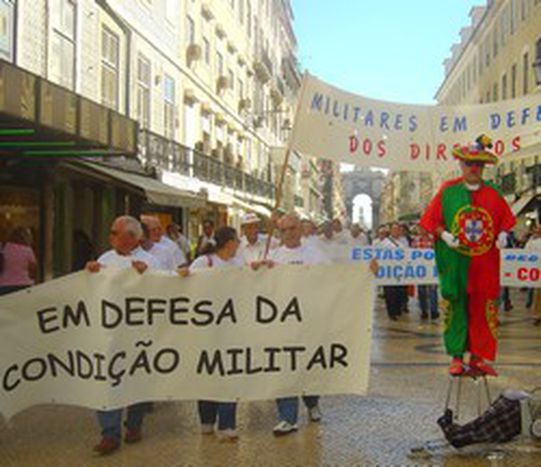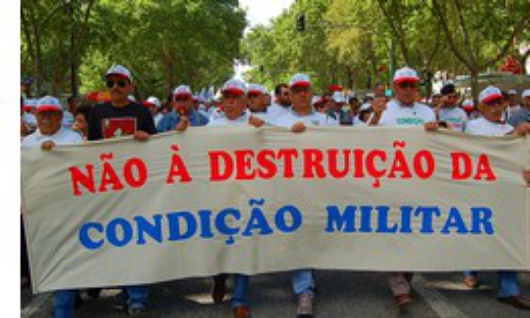
Gagging Portuguese soldiers
Published on
The facts speak for themselves in southern Europe, where 'disciplined' soldiers are forced to shut up and sign their contracts
'According to the dictionary, technically our vice president David Pereira has been 'kidnapped', because he is being held against his will and against the law,' Antonio Lima Coelho, 48, air force master sergeant and president of the National Sergeants Association (Associação Nacional de Sargentos, ANS), casually commented about his detained colleague at a press conference in the ANS Lisbon office on 30 November 2006. Almost nine months later, the Portuguese military 'disciplined' Coelho for a day on 24 August 2007. 'I was closed in a room in my airforce. I got the news, wrote, read, prepared my way out. When I was released, I repeated to the press what I had told the general the night before, when he called to tell me I was going to jail. I am not guilty about why I was arrested. But I would always do my military job.'
Coelho has been on active duty since 1978, and faced five disciplinary military procedures to date. A few days ago, another of his colleagues was detained for five days for a comment he had made on 23 November. 50 similar cases have occurred in the last two years; Portuguese soldiers can't speak to the press or pose simple questions to their assocations about being paid or promoted.
Endangering discipline
On 29 August 2001, the government unanimously voted in parliament for an organic law guaranteeing professional soldiers the 'right of association'. Paradoxically, officers and sergeants on active duty - as well as retired personnel independent of the army – are not free to collaborate and participate in military discourses, workshops and demonstrations. The struggle itself came to light in 1988, around the time when sargeants began to gather in pavilions to speak about the need for a separate organisation to deal with their health and social care. A recent August legislation re-opened the confused debate and worsened conditions, for example by limiting the number of people who can be elected as board members.
Military associations and trade unions are successful in countries like the Netherlands, Denmark, Belgium, Ireland and Germany. 'Their sense of duty or discipline is not compromised, but heightened,' says Coelho. 'Military leaders argue that such actions endanger armed forces discipline. But it's not because I am the chairman of an association that I have become an undisciplined soldier! Being in an association increases my level of responsibility. We are creating a more dangerous situation by punishing subordinates for nothing.'
Mediterranean infliction
The majority are confined to their barracks as punishment – across the Iberian border too, where the Spanish government plan to rework an unimplemented law. 'It's strange,' says Emmanuel Jacob, secretary-general of the European Organisation of Military Association (EUROMIL), the only umbrella association in Europe membering 22 countries and their associations. His colleague Jorge Bravo Alvarez, 47, chairman of the Spanish associaton ('Associacion Militares Españoles', AUME), was imprisoned on 25 January after a comment he made at a Madrid Spanish civil police (Guardia Civil) meeting about a helicopter accident in Afghanistan, where 17 of his countrymen died. 'He was treated like a dangerous prisoner,' exclaims Jacob. 'The conditions were terrible – no television, internet access or books. But he was positive, and wants to continue the struggle.'
In Italy there is also an ongoing debate for the right to have associations. 'It's down to southern culture,' guesses Jacob. 'Governments fear that once the soldiers get rights, they will lose discipline.' Coelho points to history to explain the phenomenon. 'Portugal was ruled by a dictatorship heavily supported by the military. The lower ranks may have brought democracy via revolution in 1974, but they are still denying soldiers a voice.'
EU, no thanks
 'We've approached the authorities by explaining that something is clearly going wrong, whilst putting forward positive points and arguments,' says Jacob, who reports that the EU commission have indicated they are 'not really convinced and can't prioritise the problem - but it is certainly something they should deal with.' Indeed, Brian Durnin from the EU military staff confines it to being a 'matter between member states'.
'We've approached the authorities by explaining that something is clearly going wrong, whilst putting forward positive points and arguments,' says Jacob, who reports that the EU commission have indicated they are 'not really convinced and can't prioritise the problem - but it is certainly something they should deal with.' Indeed, Brian Durnin from the EU military staff confines it to being a 'matter between member states'.
Coelho's view on the circa 2, 000 Portuguese troops currently stationed in Afghanistan, Lebanon, Bosnia, Kosovo, the former African Portuguese colonies and East Timor, is simple. 'How come the law that millions of Portuguese made an oath to respect and defend - even at the risk of our lives, which is done without question – do not apply to us at home?' EUROMIL is currently waiting on news from various meetings held in early September with the Ministry of Defence. Representatives from the ruling Socialist and opposition Social Democrat parties refused to show alongside other parliamentary delegations the day before. The current EU presidents have not commented on the matter.
In-text photo: Peaceful demonstration, 33rd aniversary of the 'Carnation Revolution', 25 April 1974. 'We do not endanger the cohesion and discipline of the armed forces as our politicians and military leadership try to suggest' (ANS Antonio Lima Coelho)



